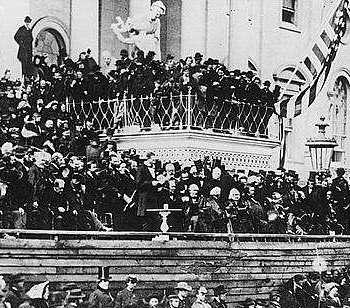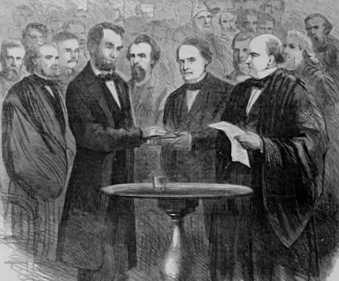Home | News | Books | Speeches | Places | Resources | Education | Timelines | Index | Search
The festivities started with the traditional procession down Pennsylvania Avenue from the White House area to the Capitol. When the rain let up an exhuberant crowd enjoyed the parade. "The sidewalks are jammed with people, and every window and house-top was filled with ladies and gentlemen, who are waving handkerchiefs and hats with great enthusiasm," a reporter wrote. They saw the usual bands, floats and marchers, and for the first time, "companies of colored troops, a lodge of colored Odd-Fellows in regalia." The crowd cheered the President's carriage, but he was not in it. As a reporter wryly remarked, "it was a play of Hamlet with Hamlet left out. The President was already at the Capitol, busily engaged in signing bills." Mrs. Lincoln was a passenger, however.
Lincoln Reads the Second Inaugural Address
Library of Congress
Abraham Lincoln's Second Inauguration
Saturday, March 4, 1865, started out dark, damp, and disagreeable. Most streets in Washington remained unpaved, and two days of incessant rain created a record amount of mud. "The streets and sidewalks were encrusted with from two to ten inches of muddy paste, through which men and horses plodded wearily," wrote a local reporter.Tens of thousands of visitors streamed into town for the reinauguration of President Abraham Lincoln, filling "every available room, bed, nook, and corner," only to reckon with the mud and one another. But the intrepid crowd would be rewarded with a ceremony of historic proportions and the finest speech this president ever produced.
The famous ex-slave Frederick Douglass also was misled by the carriage, but unlike most others, he correctly sensed potential danger. "I felt then that there was murder in the air, and I kept close to his carriage on the way to the Capitol, for I felt that I might see him fall that day. It was a vague presentiment." As events later revealed, Lincoln's assassin was in the inaugural throng and boasted of being within shooting range; six weeks later he killed Lincoln in a Washington theatre.
Before the inaugural address, Lincoln attended traditional Senate ceremonies when senators were sworn in, the outgoing vice president offered a farewell, and the new one took the oath of office. While the main crowd waited outside in the mud, an invitation-only group packed into the chamber: senators and representatives, military and naval officers, cabinet members, Supreme Court justices, the diplomatic corps in full court costume, and Mrs. Lincoln, resplendent in black velvet trimmed with ermine.
This year a painful episode took place before the horrified audience. After Vice President Hannibal Hamlin's "solemn and well-chosen words," his successor Andrew Johnson "launched into a detestable discourse pronounced in a still more detestable manner," according to a Frenchman. Johnson, ill and nervous, was clearly drunk. The secretary of the Senate said, "I can never forget President Lincoln's face as he came into the Senate Chamber while Johnson was delivering his incoherent harangue ... he took his seat facing the brilliant and surprised audience, and heard all that took place with unutterable sorrow." Finally Johnson took the oath of office, the senators were sworn in, and Lincoln headed outside to deliver his speech.
The traffic flow inside was so poor that not everyone could reach the Capitol east front to hear Lincoln's message. Ironically, that included Mrs. Lincoln and her cousin. They were escorted to the Senate by James Harlan of Iowa and Henry Anthony of Rhode Island. A New York reporter noticed, "Senator Anthony was called to take the oath of office and left the ladies in charge of Senator Harlan, who, with great difficulty, escorted them through the crowded passage ways to the reserved seats on the platform, but where they arrived too late to witness the Inaugural ceremonies."
Northern reporters on the scene could not help contrast Lincoln's two inaugurations. One noted that four years earlier "the weather was dry, and tornadoes of dust swept through the streets," and the atmosphere was foreboding and warlike. "The city was filled with rebels who proclaimed their sentiments boldly in the streets, and hinted violence to the Executive." Another commented, "To-day the scene was totally changed. The city was joyous and confidant....The fears of the olden times were forgotten. Happy faces and cheerful greetings were everywhere observed....The solemnity of 1861 had given place to the joyousness of 1865."
Immense changes swept through the country during the intervening four years. The nightmare of civil war was nearly over, the federal union had been maintained, the Thirteenth Amendment abolishing slavery had passed Congress, and the Capitol dome was complete, topped by a statue of Freedom. With peace a distinct prospect, the future looked bright. Few expected to witness the public assassination of President Lincoln the next month, or pass his coffin in the great Capitol Rotunda.
When President Lincoln and invited dignitaries walked onto the huge platform they saw a crowd of between 30,000 and 40,000 people. A witness said, "The grandeur of the spectacle before me was indescribable." He marvelled, "Thousands of colored folk, heretofore excluded from such reunions, were mingled for the first time with the white spectators."
Reporter Noah Brooks, a friend of the Lincolns, saw what many others remarked about: "just as Lincoln stepped forward to take the oath of office, the sun, which had been obscured by rain-clouds, burst forth in splendor." The next day Lincoln asked him, "Did you notice that sunburst? It made my heart jump." On Sunday, in a sermon at the Capitol attended by the Lincolns, Methodist Bishop Matthew Simpson alluded to the sunburst and said in the same sudden manner, peace would "burst upon the nation and dispel the clouds of war." Other inaugural observers noticed the remarkable appearance of a star/planet in the mid-day sky.
A mounted member of Lincoln's bodyguard watched nearby as the president read his speech in a strong, clear voice to the vast, expectant crowd. "They seemed to hang on his words as though they were meat and drink," he recalled. "And when he concluded the last paragraph, beginning, 'With malice toward none, with charity for all,' which fell like a benediction from heaven, the shout of the people seemed to rise to the very sky."
Throughout the Northern states and Europe, Lincoln's speech was widely praised, although the New York Herald dismissed it as a "little speech of 'glittering generalities'." However, another writer from the same newspaper said Lincoln looked "unusually handsome" and while speaking "his face glowed with enthusiasm, and he evidently felt every word that he uttered." A New York Times writer praised the speech for "its calmness, its modesty, its reserve" and declared, "We have a President who will be faithful to the end."
Lincoln Takes Oath of Office, March 4, 1865
Library of Congress
Lincoln then took the oath of office from Supreme Court Justice Salmon P. Chase, his former secretary of the Treasury and ongoing presidential rival. Lincoln nominated him after Roger Taney's death the previous year, adding yet another twist to the inaugural drama, for Taney wrote the pro-slavery opinion in the Dred Scott case, only to be replaced by Chase, the abolitionist. Chase marked the place in the Bible that Lincoln kissed, which was Isaiah 5:27-28. The thunder of cannon announced the ceremony's end and the procession returned to the White House, with Lincoln and his youngest son in the lead carriage. Mr. and Mrs. Shelby Cullom, old friends from Lincoln's hometown in Illinois, watched from a nearby window. Mrs. Cullom saw "the exalted look which Mr. Lincoln wore." She recalled, "It was the look of a man inspired," which surprised her because it was the "first time that anything about Lincoln impressed me as remarkable." To her, his face appeared to have "the most peaceful, sublime and prophetic look which a human countenance could assume."
At a White House reception on inauguration day Lincoln told Frederick Douglass he had seen him in the Capitol crowd and pressed him for his opinion of the speech. His response aptly summarized the theologically rich speech: "Mr. Lincoln, it was a sacred effort." As for Lincoln, later in March he wrote that he expected the speech "to wear as well as -- perhaps better than -- any thing I have produced."
Related Links
Lincoln's First Inauguration
Lincoln's First Inaugural Address
Lincoln's Inaugurations
Lincoln's Second Inaugural AddressRelated Reading
Brooks, Noah. "Personal Reminiscences of Lincoln." Scribner's Monthly, March 1878
Brooks, Noah. "Lincoln's Reelection." The Century Magazine, April 1895.
de Chambrun, Marquis Adolphe. Impressions of Lincoln and the Civil War. New York: Random House, 1952.
Forney, John. Anecdotes of Public Men. New York: Harper & Bros, 1873.
Gobright, Lawrence Augustus. Recollections of Men and Things at Washington. Philadelphia: Claxton, Remsen & Haffelfinger, 1869.
Iowa State Register, March 15, 1865.
New York Herald, March 5, 6, 1865.
New York Times, March 5, 6, 1865.
New York Tribune, March 4, 6, 1865.
Schurz, Carl. The Reminiscences of Carl Schurz. New York: Doubleday, Page & Co., 1909.
Stimmel, Smith. Personal Reminiscences of Abraham Lincoln. Minneapolis: William H.M. Adams, 1928.
Washington Star, March 4, 1865.
White, Ronald C. Jr. The Eloquent President: A Portrait of Lincoln Through His Words. Random House, 2005.
Wilson, Douglas L. Lincoln's Sword: The Presidency and the Power of Words. Alfred A. Knopf, 2006.
Home | News | Education | Timelines | Places | Resources | Books | Speeches | Search Copyright © 2024 Abraham Lincoln Online. All rights reserved. Privacy Policy


